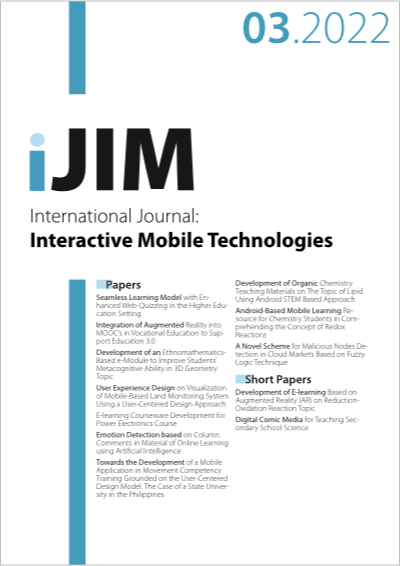Towards the Development of a Mobile Application in Movement Competency Training Grounded on the User-Centered Design Model: The Case of a State University in the Philippines
DOI:
https://doi.org/10.3991/ijim.v16i03.26447Keywords:
mobile application, user-centered design, physical education, movement competency training, flexible learningAbstract
The corona-virus disease (COVID)-19 pandemic has caused extreme disruption in the delivery of instruction in many educational institutions all over the world. However, this circumstance may not only be a challenge but also an opportunity to foster learning through exploration of various technologies that can be developed, more specifically in a course characterized with a strong skills-based orientation such as physical education (PE). Therefore, the aim set in this study was to develop a mobile application for Movement Competency Training (MCT) grounded on the User-Centered Design Model. This descriptive mixed-method research started with a preliminary needs assessment analysis which was participated by 121 Filipino students enrolled in the MCT course and 10 PE teachers. Results revealed the skills that require a higher degree of proficiency such as non-locomotor skills, locomotor, and mobility skills. Also, the majority of the respondents are mobile phone users which justified the adoption of mobile instruction and the development of an application for MCT. Moreover, indicated in this research was the preference of the intended users in terms of design and interface that led to the development of the mobile application and had specified the requirements based on the users' needs. The initial assessment of the developed application indicated a highly acceptable level of functional suitability, usability, and portability by the student-respondents. A field testing of the application may be recommended to determine its effectiveness in mastering the skills in MCT independently.
Downloads
Published
How to Cite
Issue
Section
License
Copyright (c) 2022 Rodel B. Punzalan, Julius Ceazar G. Tolentino, John Paul P. Miranda, Jomari C. Manalang, Lovely Kate S. Hermogenes, Jayson T. Mallari

This work is licensed under a Creative Commons Attribution 4.0 International License.



